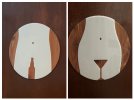I’ve looked in the legend of symbols for “WC” used throughout the guidebook of the Via Podiensis by Cicerone and can’t find it. Can someone familiar with the guidebook tell me what WC stands for?
Toilet, Restroom, Bathroom (Engl., I personally find "Bathroom" ridiculous, as I don't want to take a bath, when....)
WC, (VC) (International), French)
Toilette, Toalete (German, French, Italian, Portuguese
)
Servicio, Servizi (Spanish, Italian)
Baño, Bagno, Banheiro (Spanish, Italian, Portuguese)
Cabinet, Gabinetto (French), Italian)
Klo (German)
Aseo (Spanish)
Lavabo (Spanish, Portuguese)
Inodoro (Spanish)
Sanitarios, Sanitário (Spanish, Portuguese)
Retretes, Retrete (Spanish, Portuguese)
With this, you should be able to manage the situation pretty easily
































